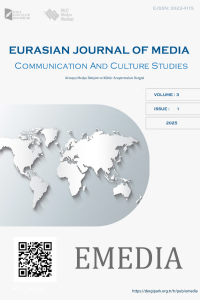Öz
İletişim teknolojilerinin tarihsel ilerleyiş süreci, hem bir araç hem de bir ortam olarak medyanın yeniden biçimlenişiyle sınırlandırılamamaktadır. Medyanın biçimi teknolojik gelişim süreci kadar düşünsel süreçleri de içerisinde barındırmaktadır. Medyanın gelişim süreci, insanlığın gelişim süreciyle el ele ilerlemiş, medeniyetin seviyesi medyanın biçimini de belirlemiştir. Aydınlanma’dan modern devletin yükselişine, 20. yüzyılın ortalarında ortaya çıkan postmodern dönemden içerisinde bulunduğumuz 21. yüzyılın ilk çeyreğinin bitiş arifesine dek medya biçimlenişleri, çağının özelliklerinin bir yansımasını sunmuştur. Birer tarihsel uğrak olarak Aydınlanma, modernizm ve postmodernizm süreçlerinde insanlığın yaşadığı düşünsel dönüşüm, bir şekilde kendisini bir ortam ve araç olarak medyanın biçimlenişiyle somuta erdirmiştir. Marshall McLuhan’ın araç mesajdır ifadesi, konu özelinde Post-Truth düşünselliğinin yeni medyanın biçemini oluşturması şekliyle somutluk kazanmıştır. İletişim araçlarının insanlık tarihinin geniş bağlamı içerisindeki kullanımları ve ortaya çıkardığı sonuçlar, insan davranışı ve toplumsal deneyimin gelişiminin değerlendirmesi, bu çalışmanın kapsamını çokça aşmaktadır. Yine de çalışma, tarihsel izleği takip ederek, Habermasçı anlamda kamusal bir hüviyete karşılık gelen medyanın yapısının, dijitalleşmeyle birlikte artık profesyonellikten vazgeçen, hiçbir editoryal denetime tabi tutulmayan ve bunu özgürleşim olarak satan parçalı, izole, fragmanlaşmış kamusallığı beraberinde getiren bir yapıya bürünme süreci detaylandırılmaktadır. Kamusallığın geçirdiği yeni yapısal dönüşüme giden yolda öncelikle tarihsel bir süreci temsilen ve aynı zamanda düşünsel bir sürecin de ifadesi olan Post-Truth fenomenine kaynaklık eden kavramlar açımlanmakta, akabinde fenomenin Yankı Odaları (Echo Chambers) ile olan ilişkiselliğine odaklanılmaktadır. Son bölümde ise Yankı Odalarının oluşumu ile parçalanan kamusallığın özne ve müzakere mefhumları üzerinden olası toplumsal sonuçları ele alınmaktadır.
Anahtar Kelimeler
Kamusal alan müzakereci demokrasi post-truth yankı odaları yeni medya
Kaynakça
- Allcott, H. ve Gentzkow, M., (2017). “Social media and fake news in the 2016 election”. Journal of economic perspectives, Volume 31, Number 2, ss. 211-236.
Examining The New Structural Transformation of the Public Sphere Within the Framework of Post-Truth and Echo Chambers
Öz
The historical progress of communication technologies cannot be limited to the reshaping of the media as both a tool and a medium. The form of the media includes intellectual processes as much as the technological development process. The development process of the media has progressed hand in hand with the development process of humanity, and the level of civilisation has determined the form of the media. From the Enlightenment to the rise of the modern state, from the post-modern period to the eve of the end of the first quarter of the 21st century, media formations have presented a reflection of the characteristics of its age. The intellectual transformation experienced by humanity in the processes of Enlightenment, modernism and postmodernism as historical periods has somehow materialised itself in the formation of the media as a platform and instrument. Marshall McLuhan's The medium is the message has been concretised in the form of Post-Truth intellectuality forming the style of the new media. The use of communication instruments within the broader context of human history and their results, the evaluation of human behaviour and the development of social experience are far beyond the scope of this study. Nevertheless, following the historical path, the study details the process by which the structure of the media, which corresponds to the public sphere in the Habermasian meaning, has become a piecemeal, isolated, fragmented public sphere, which, with digitalisation, has given up professionalism, is no longer subject to any editorial control, and calls this liberation. On the way to the new structural transformation that the public sphere has undergone, the concepts that are the source of the Post-Truth phenomenon, which represents a historical process and is also an expression of an intellectual process, are explained, and then its relationality with Echo Chambers is focused. In the last section, the possible social consequences of the publicness fragmented by the formation of Echo Chambers are discussed through the notions of subject and negotiation.
Anahtar Kelimeler
Deliberative democracy echo chambers new media post-truth public-sphere
Kaynakça
- Allcott, H. ve Gentzkow, M., (2017). “Social media and fake news in the 2016 election”. Journal of economic perspectives, Volume 31, Number 2, ss. 211-236.
Ayrıntılar
| Birincil Dil | İngilizce |
|---|---|
| Konular | Yeni Medya |
| Bölüm | Araştırma Makaleleri |
| Yazarlar | |
| Yayımlanma Tarihi | 26 Haziran 2025 |
| Gönderilme Tarihi | 27 Mayıs 2025 |
| Kabul Tarihi | 17 Haziran 2025 |
| Yayımlandığı Sayı | Yıl 2025 Cilt: 3 Sayı: 1 |
Eurasian Journal of Media Communication and Culture Studies by İzmir Katip Çelebi University is licensed under Attribution-NonCommercial 4.0 International
İzmir Katip Çelebi Üniversitesi tarafından yayımlanan Eurasian Journal of Media Communication and Culture Studies Attribution-NonCommercial 4.0 International ile lisanlanmıştır.


